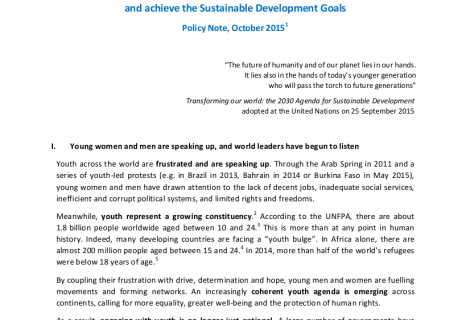
Beyond Smiling Faces: How engaging with youth can help transform societies and achieve the Sustainable Development Goals
Youth across the world are frustrated and are speaking up. Through the Arab Spring in 2011 and a series of youth-led protests (e.g. in Brazil in 2013, Bahrain in 2014 or Burkina Faso in May 2015), young women and men have drawn attention to the lack of decent jobs, inadequate social services, inefficient and corrupt political systems, and limited rights and freedoms.
An increasingly coherent youth agenda is emerging across continents, calling for more equality, greater well-being and the protection of human rights. As a result, engaging with youth within formal, institutional spaces is no longer just optional.
This joint policy note speaks to the growing recognition that youth-led development should be explored and developed as a key driver for the SDGs, but also far beyond this! Young women and men are already drivers in achieving non-violent democratic social transformation.
The paper calls for development cooperation agencies (governments, donors, and CSOs) to better understand their supportive roles and :
- Be open to a shift in organisational attitude and culture.
- To create an enabling environment for youth inclusion: formal institutions will need to become more flexible in giving young people a real voice. They will need to reach out and actively support youth groups, while accepting and safeguarding their independence. Contributions and provocative challenges made by young women and men will need to be made visible and addressed in the policy process.
- Governments and development agencies will also need to deepen their understanding of the concerns, needs and potential contributions of young women and men.
Young women and men are fast drivers on the road to global development and social change. Governments must make sure they are not left behind.